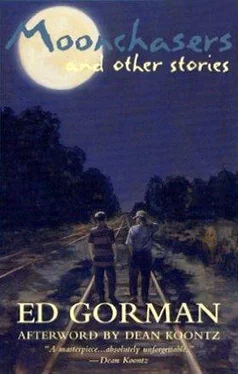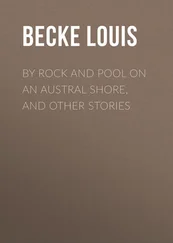“I can’t explain right now, son. But you get over here to the police station right now.”
“How about Barney?”
“You let Barney’s folks worry about Barney. Right now my only concern is you.”
“Yessir.”
This late at night, the old town was pretty neat. Almost nothing moved, all the cars were parked, all the people were inside, and the streetlight shadows gave everything the texture and depth of a very gentle painting of a small town all asleep.
I rode my bike through the empty town square and down the block past all the storefronts where the mannequins watched me go. Only the taverns were open, big hot smoky machines grinding out chilly neon light and jukebox wisdom and hard desperate laughter. As I went by I smelled yeasty beer and dirty cigars.
There was a Channel 3 station wagon parked in the No Parking space in front of the police station. Up on the top of the steps stood Chief Pike and Detective Cushing being interviewed by a whole gaggle of reporters. Everything was a blaze of light and a click and clack of still cameras and motion picture cameras. The mayor was there and all the city council and maybe six local gendarmes in uniform and—
And Barney.
He stood right between Pike and Cushing.
And as I dropped my bike on the sidewalk and started walking toward the front of the station, Barney started talking into this microphone this reporter had put in his face.
“How does it feel to be a hero, Barney?”
A hero? What the hell was going on here? All I could think of was how strange Clarence had sounded on the telephone, how he’d said, “This isn’t turning out the way I thought.”
And then Chief Pike saw me and shouted, “Look! There’s our other hero now!”
Fifty faces turned to look at me. Me — the most self-conscious guy I knew. Even walking up in front of a class to read a paper makes me sick to my stomach. All those eyes staring, staring — and right at me.
And the reporters deserted Pike and Cushing and Barney and came running down the stairs toward me.
I wasn’t sure what to do. I wanted to run but I knew I’d better not do that.
“How does it feel to be a hero?” asked this guy in a bow tie and straw hat.
“I’m afraid I—” I started to say.
Flashbulbs went nova in my face. I was blinded.
“No need to be modest,” another reporter said. “Detective Cushing told us all about it. How you and Barney called him and told him where to find Roy Danton. You boys are heroes!”
“Too bad Detective Cushing didn’t find the money, though,” said a third reporter.
“Danton hid it somewhere around here, you can be sure of that,” an auxiliary cop named Michaelson said. He was one of Cushing’s friends, or liked to pretend he was anyway. But mostly he was a fat, pushy jerk.
My sight was starting to come back.
I raised my eyes and looked up the stairs to Barney. He just shrugged, seeming just as confused about all this as I was.
“Even without the money, though,” the reporter with the bow tie said, “you boys’ll get some kind of reward. You just wait and see.”
And then I felt an arm slide around my shoulder and when I turned my head I saw Clarence.
“How does that boy of yours make you feel?” asked a reporter.
“Proud. Darned proud.”
“Let’s get a picture of you two just like that,” said a photographer.
Then they all started snapping pictures.
And then somebody had the notion of me and Clarence going up the steps for a group shot. And after the group shot—
“How about you two boys standing over there on either side of Detective Cushing? We’ll get a good shot of just you three.”
It was all kind of like a movie, real and unreal at the same time, especially the part where Barney and I stood on the step beneath Cushing so he could put his hands on our shoulders.
“That’s great! Just great!” cried the photographer. “Now if I could just get you boys to smile a little!”
Cushing dug his hands into our shoulders and leaned down and whispered, “I saved you two little assholes from going to reform school. So smile!”
So we smiled. Or tried to, anyway, but right now all I could think about was what a clever sonofabitch Cushing was, one hell of a lot cleverer than I ever would have thought.
And when the reporters were through with us they concentrated on Cushing alone. They sounded like high school girls cooing over Elvis.
“Were you scared going into that dark warehouse when you knew somebody like Roy Danton was in there?”
“Well, scared, sure, but that’s what the folks in this community pay me to do.”
“How’d you finally bag him, Detective Cushing?”
Another self-effacing shrug. “Just kind of snuck up on the closet where my two good friends Tom and Barney told me he’d be. Then I just told him that I was giving him twenty-five seconds to come out with his hands above his head or I’d be coming in.”
“He say anything to that?”
Boyish grin. “Well, yes, he did say something to that but it sure isn’t something I could repeat here.”
“Then what happened?”
“Well, a policeman’s only as good as his word. I’d warned him that I’d be coming in and that’s just what I did. I kicked the door open and went in.”
“Is that when he shot at you?”
He nodded. “One shot was all he had time to get off. That’s when I killed him.”
Barney and Clarence and I stood there and watched this Academy Award performance and I’m sure we were all thinking the same thing. Good ol’ Cushing was going to have it every which way he wanted it. He’d killed a man in cold blood and he’d stolen nearly $50,000 in cash yet he was being treated as a hero.
And the only two people who could testify against him couldn’t say a word because by now nobody would believe them. They were all running after Cushing like kids after a Fourth of July float.
I couldn’t take any more. I just kept thinking of Roy and how eternity had talked back to me. I said to Clarence, “I’m going home.”
I was about to say something else when people started turning their heads to the old white Buick ambulance slowly making its way around the far edge of the town square.
It was headed to the hospital. With Roy inside.
If Cushing saw it, he didn’t let on. He still stood at the top of the stairs, showing his gun to reporters and letting them get close-ups of it. The chief just walked around shaking everybody’s hand as if Cushing had given birth to a fifteen-pound baby or something. Just then Cushing did look up. He stared right at me. Ordinarily, what I saw in his eyes would have frightened me. But right now I didn’t care. Right now all I could think about was Roy.
He held my gaze for a long time, giving me a full dose of his threatening look. Then he went back to a reporter who was snapping yet another picture.
More people kept coming. By now all the parking spaces around the square had been taken up. Some people didn’t even seem to know what was going on. They’d just heard the noise and seen the lights and drifted over from their humid summer beds. It all reminded me of the scene in Invasion of the Body Snatchers where all the people in town come to the square so they can be made into pod people. I guess I was pissed off enough at the moment to think of Somerton that way — exulting in Detective Cushing’s bravery without questioning it for a moment. Or wondering how it was that an already badly wounded man had needed to be shot to death. No, they didn’t know these things but in their frenzy to have a hero, they wouldn’t listen to them, either, even if I’d brought them up.
I went down to my bike and rode home.
Mom and Debbie were up in the living room. I went over and kissed them good night and started up the stairs. “Aren’t you going to tell me what happened?” Mom asked.
Читать дальше












